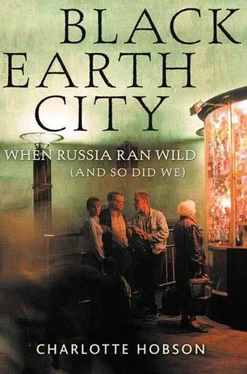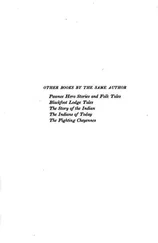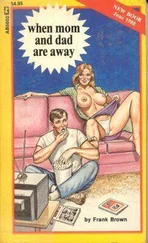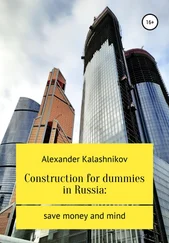“Oh. Cigarette, then?”
“I don’t drink or smoke. I’m a Baptist,” I added. “From Riga.”
“Oh.” He drew away. As I’d hoped, the bit about Riga stopped them from asking me about my accent. At the hostel the men let me out politely. My pulse was still racing when I got back to our room.
There, in my bed, lay Mitya. He was fully dressed, asleep and snoring. On the other side of the room, Emily sat up and looked at me.
“You’re back. I was worrying.”
“When did he get here?”
“Oh, ten minutes ago. I couldn’t get a word out of him. But someone said he’d been taken to the vytrezvitel in a van, then let out straight away. They didn’t keep him—I suppose tonight they didn’t have room.”
A shiny purple bruise was appearing on his temple. The room was quiet; Ira was sleeping in the third bed, breathing softly.
“We have to call and confirm our return tickets this week,” Emily whispered.
In two months we were going home. I squeezed into the bed beside Mitya, blinked at the ceiling, and thought: Flying away. Relief, like sleep, engulfed me.
There’s no returning to the heart:
The dead to the environs go
Away from resurrected stone.
Reducible to soil and snow
They hem the town in hard as bone:
The outer zones of Voronezh.
ALAN SILLITOE,
LOVE IN THE ENVIRONS OF VORONEZH , 1968
Petya Pravda’s dead. At the end of spring he died, as elongated and translucent as an icon. His mother found him in the morning and straight away set up a wail that brought in the neighbors: Pyotr! Petya! My little Petya! And they hurried in, old Kolya hitching up his belly, stinking of hangover, Anna Nikolaevna already back from the market, and Petya’s aunt Ludmilla, wrapped in her robe with emerald eye-shadow on one eye.
This wasn’t the first time they’d come running to this cry. More than once, Kolya had dashed off for the doctor, while Ludmilla tremblingly applied the first aid she learned at the factory. Petya would suddenly blink, so pale it seemed the color had left even his irises, and with a ghastly crimson ring of Ludmilla’s lipstick smeared around his mouth. All the women would start laughing and crying. Ludmilla would wipe the lipstick off with a thumb. And Petya would just lie there and, after a few moments, turn on his side and close his eyes.
This time, however, he had stopped breathing during the night, and by morning there was nothing anyone could do. His mother, who was almost crippled by arthritis, was persuaded to rest. Kolya closed Petya’s eyes with fifty-kopeck pieces, and the women organized the funeral. By the time we saw him he was stretched out on a table and surrounded by crosses and incense. I thought how amused he would have been by his Orthodox sendoff—yet, in a way, it wasn’t inappropriate.
Pyotr Pravda—Peter Truth. Part of the burden of life that Petya found repellent must have been his name—how to live up to such a name! The first Pyotr Pravda, his grandfather, a railway worker who fought in the civil war, had taken the surname as a new beginning in a brand-new world. There was a black-and-white photograph of him in the front room: a bony face with dark eyes, a medal-decked chest, and a Soviet passport, touched up with red ink, poking out of his top pocket. Petya looked identical, although he had none of the pride that bristled from his grandfather’s portrait. His mother got Petya to hang the photo up not so long ago. “There,” she said. “I only knew him when he came back from the camps, like a little old nut and grumpy as hell. May he rest in peace,” she added.
His grandfather’s truth had aged by the time Petya inherited it. Not that Petya worried about such complexities at first, of course. The fat little Petya of early photographs, wrapped up in six layers of artificial fur so he stood stiff as an overstuffed bear, holding the string of a toboggan, and beaming as hard as his chubby, chilly face would allow—he was no child philosopher. Perhaps the shadow that crept over him was particular to his experience: vodka in the courtyard at fifteen, military service and beatings by the tough guys, a two-room apartment with an invalid mother, and Friday evenings in small-town Russia, a pack of young men bursting with energy and nowhere, nowhere for them to expend it. By the early nineties, Pravda was no more than a sensation-seeking rag. No kind of word to have on your identity card.
At the beginning of the year Petya was at university with the rest of us. He was too thin, with a boyish, energetic manner, and he wore the same threadbare jacket summer and winter. He was not a diligent student; he and the Narcomen kept themselves occupied without having to attend lectures. The exams, when the time came, were oral—no problem. I sat in on one of Petya’s exams, once. Mitya and I had been up all night with him and Lapochka when he decided that I had to go with him as his talisman. That was the kind of joke he enjoyed.
Petya’s mother, Polina Pravda, had a tendency to keep every bit of paper, including her doctor’s notes from the days when her illness was not so advanced. So we arrived at the faculty together and presented the lecturer with a note stating that P. Pravda had arthritic cramps, and three days’ bed rest was essential.
The professor, Maria Mikhailovna, was a motherly figure well known for her susceptibility to young men, but even she raised her eyebrows a little as Petya assured her that he wouldn’t miss this exam for the world: “To lose a chance to defend my Pushkin would set me back even further, Maria Mikhailovna. You understand me.” He fixed her with his dark eyes. “But Charlotte has agreed to rub the affected area during the exam, if you don’t object.” And I stood behind him with my hands poised ready on his shoulders.
“Pushkin massages his words into place,” Petya began, making me snort. He continued smoothly. “Even the clumsiest, most unmanageable Russian verb, stiff with prefixes and trailing an endless, glutinous reflexive agreement, is made to feel supple and extraordinarily powerful… because each verb occupies an unassailable position in Pushkin’s world, in the world of language, a world that is lucid and vivid, ordered and yet more spontaneous than our own—a world that is, in fact, more real than reality.”
Maria Mikhailovna smiled dreamily and marked him as “excellent.”
The Narcomen rolled their joints on the photograph of old Pyotr Pravda and talked about their latest discoveries in music or literature. Yet they shared the conviction that brains were no good to them in their Russia. “What’s the point?” they said to me. “To be successful, you either need connections or you need to be a thug. You don’t need brains.”
This made me angry. “But how can you say that? Maybe under Brezhnev it was true, but now there is every opportunity! You can work, write, start a business, be free—”
“Oh yes?” The Horse looked at me coolly. “For a moment drop your assumption that elections and a free press mean democracy, which is the solution to all social ills, and think. Free thought? I’ve had that all my life. Of course there was a shortage of books and tapes before, but we passed them around… we got hold of things. We had less, but we appreciated it more. Travel? In the old days we could travel, spend the summer in Dubrovnik, sail on Lake Baikal, walk in Karelia. A ticket to Moscow cost seven rubles then—now it’s twenty-five thousand. I can’t afford to go up to Moscow, let alone look for a job there, rent an apartment for hundreds of dollars a month, buy a suit. Start a business? Just look at the kind of guys running businesses in Voronezh. Do you think it is just a coincidence that they all have these low, bulging brows, these arms too long for their bodies, this distinct similarity to apes in their maroon jackets? The only businesses that succeed in this transitional period are rackets. And I’m not interested.”
Читать дальше












